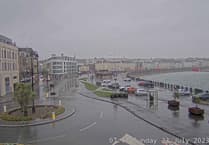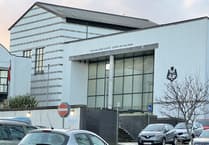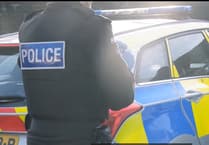Witnesses were questioned yesterday (Thursday) in a manslaughter court case.
Construction worker Gary Skelding, who was working for Stewart Clague Services, was killed on August 4, 2020, when a scaffolding platform fell on him during work at King William’s College.
Mr Skelding’s supervisor, Stephen Phillips, is accused of manslaughter via gross negligence.
Responsibility for the loading of plaster board on the scaffolding is a key issue in the trial.
The court heard testimony from Colin Thomas, SCS’s project manager, and Andrew Moore, a director from Absolute Scaffolding on Wednesday and Thursday.
Mr Thomas told prosecution advocate James Robinson that he had 36 years of experience in the building trade.
A construction phase health and safety plan, prepared by Mr Thomas for the project, was presented to the jury. It instructed the labourers to ‘avoid working at heights where possible’ in order to ‘mitigate risks of falling’.
Mr Thomas told the court that Absolute Scaffolding provided the majority of SCS scaffolds.
Mr Robinson then asked Mr Thomas about a number of e-mails sent between him and Absolute, requesting an access tower so labourers could easily get to the higher levels.
debris
This order also included a rubbish chute as the primary function of the scaffolding was to move rubbish and demolition debris to a skip on the ground.
Mr Moore and Mr Thomas said that there were no discussions around applying heavy weight to the access tower.
The scaffolding platform was said to be bearing between 1.56 and 1.6 tonnes of fire boards.
Mr Moore said that higher loading requirements would have changed the format of scaffolding that Absolute would need to provide.
Mr Thomas told the court that the loading of scaffolding was not discussed between himself and the site manager, Mr Phillips, the man accused of manslaughter.
When asked by Mr Robinson whether any SCS staff had permission to alter the scaffolding at the King William’s College site, he replied: ‘No.’
Mr Robinson told the jury that Mr Phillips ‘took it on himself to change the method of work’.
Mr Thomas told the court that he was not an eye-witness to the incident.
He said that he was in an office on-site and did not know of the accident until he heard a loud crash at around 8.47am on the day of the incident.
After the collapse, Mr Thomas said he asked Mr Phillips: ‘What the **** were the boards doing on the scaffold?’
Later in the trial, Mr Thomas stated that the original purpose of the scaffolding was to ‘get gear in and get gear out’.
The ‘gear’ in question is building materials and debris from the school’s science block, which was being refurbished.
consultation
Mr Thomas told the jury there was no consultation on the day in regards to changing the plans as to how the boards were to be loaded into the building.
The witnesses said that it was common building practice that the company that erected the scaffolding should perform any alterations, after consultation with the clients.
Mr Moore told the court he received no communication about alterations needing to be made to the scaffolding.
The case continues.




